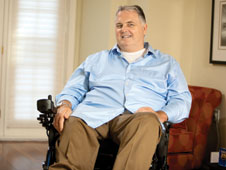Empowering the disabled

After a 1983 mugging in Virginia left him paraplegic, Ron Bielicki, AS’89, decided to devote himself to social justice.
Service was already a big part of who he was: Bielicki was in the U.S. Navy when, on shore leave, he was held up at gunpoint and shot in the back.
To say his Navy toughness served him well is an understatement. “I’d just completed boot camp, so my rehab took ninety days,” the Cape Cod native says.
When he got out of the Veterans Administration hospital in West Roxbury, Massachusetts, Bielicki set his sights on a bachelor’s degree from Northeastern.
“It was the only school I applied to,” says Bielicki, who majored in speech communication. Co-op was a draw and so was the accessibility offered by the campus’s tunnel system.
Even before graduation, Bielicki was nationally known for his commitment to gun control. He starred in two public-service announcements (one set at Northeastern). He also worked behind the scenes on the Brady Bill, the 1994 federal gun-control law named for White House press secretary James Brady, who was shot during an attempted assassination of President Ronald Reagan in 1981.
After earning his degree, Bielicki worked in public relations for the organization Wheels Across America, and for Kerry Kennedy Cuomo. In 1990, he started the WIN Foundation, a nonprofit that to date has awarded 30 new custom racing, tennis, and basketball wheelchairs to junior athletes. He’s also served on the Greater Boston chapter of the National Spinal Cord Injury Association, most recently as a vice president and a board member.
Not long ago, Bielicki was thrown another curveball. A two-year-long illness means he now has to use a power wheelchair to get around, a development he downplays as “the new normal.”
He’s philosophical about the challenges he’s faced. “I’ve experienced discrimination because of my disability, sexuality, Catholicism, Irish background, and Polish background,” he says. “It’s my lesson for this life.”
Today, he wants to raise awareness about the discrimination the disabled face in such areas as handicap parking, housing, and nursing-home care.
“We all run into obstacles,” Bielicki says. “We all have to be advocates for ourselves. We all have to speak up for what we believe.”





